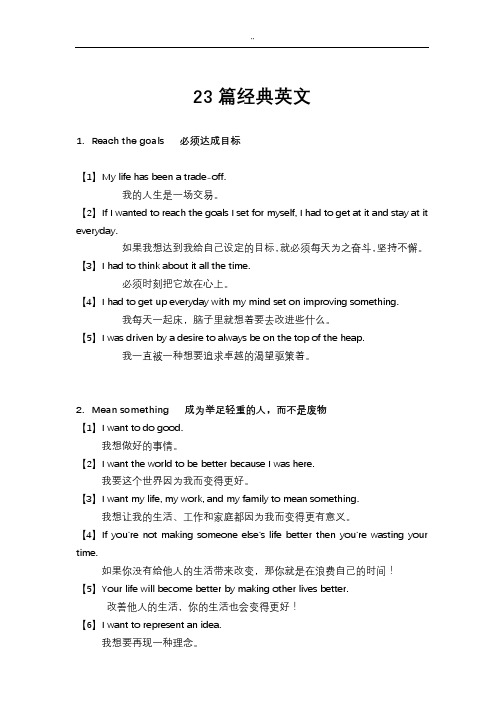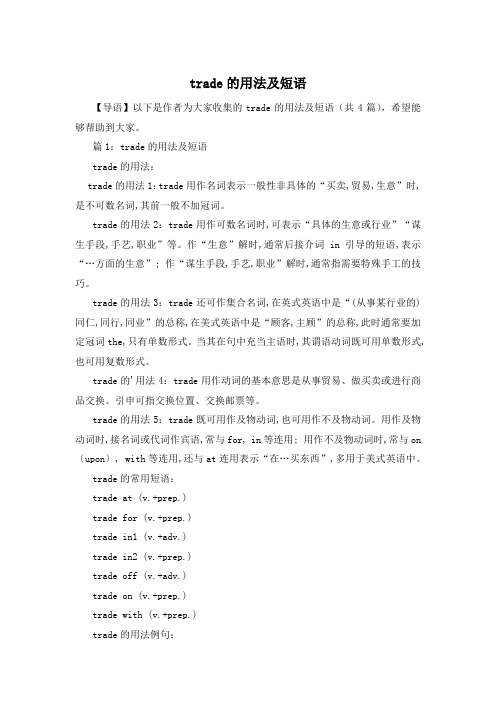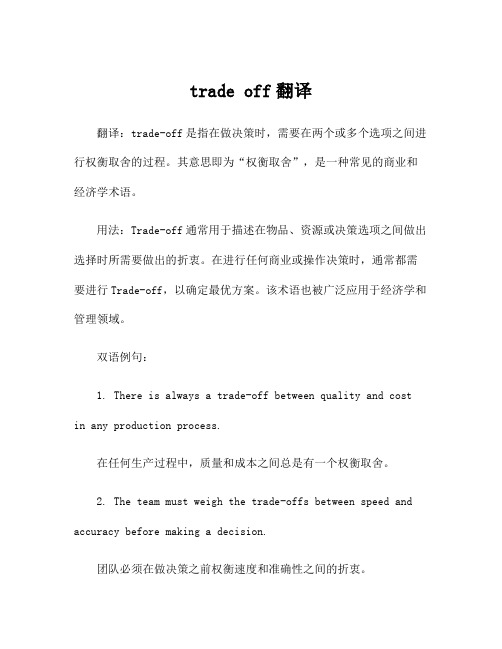人生就是一场trade off
trade的短语

trade的短语嘿,咱今天就来聊聊“trade”的那些短语呀!“trade in”,就好比你有个旧手机,不想用了,拿到店里去换个新的,这就是“以旧换新”。
比如说,“I traded in my old car for a brand new one.”(我用旧车换了一辆崭新的车)。
还有“trade off”,这就像你在两个好东西之间做选择,得到一个就得放弃另一个,有得就有失嘛。
比如,“You have to make a trade off between work and family time.”(你得在工作和家庭时间之间做个权衡取舍)。
“trade with”呢,就是和某人做交易啦。
想象一下,你和朋友互相交换礼物,“I often trade with my friends.”(我经常和我的朋友们做交易)。
咱再来说说“fair trade”,这就好像是一场公平的比赛,大家都按规矩来,谁也不欺负谁。
“We should support fair trade to ensure everyone gets a fair deal.”(我们应该支持公平贸易,确保每个人都得到公平的待遇)。
“trade secrets”,哎呀,这可是很重要的秘密呢,就像公司里那些不能让竞争对手知道的核心技术。
“They are very careful to protect their trade secrets.”(他们非常小心地保护他们的商业机密)。
你看,这些关于“trade”的短语是不是都很有意思呀?它们在我们的生活和工作中可都有着重要的作用呢!咱得好好记住它们,说不定啥时候就能用上啦!总之,这些短语让我们的语言更加丰富,让我们能更准确地表达自己的意思。
所以呀,可别小瞧了这些小小的短语哦!。
trade-off名词解释

trade-off名词解释
"Trade-off"是一个常用的名词,用于描述在做决策时所面临的
权衡和取舍。
它指的是在追求某种利益或目标时,不可避免地需要
放弃或牺牲其他利益或目标的情况。
在各个领域,人们常常需要在不同的选择之间做出决策。
这些
选择可能涉及时间、资源、成本、风险、效果等方面的权衡。
当我
们选择追求某个目标或采取某种行动时,往往会失去其他可能的选
择或带来一些不利的后果。
这种权衡就是trade-off。
举个例子来说明,假设你有一份工作机会,但需要搬到另一个
城市。
在这种情况下,你需要权衡工作机会带来的职业发展和经济
收入的好处,与离开家人和朋友、适应新环境的困难等方面的代价。
这个决策就涉及到了trade-off。
在经济学中,trade-off也是一个重要的概念。
经济学家常常
研究资源的有限性和人们的无限欲望之间的关系。
在资源有限的情
况下,人们需要在不同的需求之间做出选择。
例如,一个国家在分
配资源时可能需要权衡教育、医疗、基础设施建设等各个领域的需求,这就是经济上的trade-off。
总之,trade-off是指在做决策时所面临的权衡和取舍,即为了追求某种利益或目标而不可避免地放弃或牺牲其他利益或目标。
它在个人生活和各个领域都起着重要的作用。
trade的用法归纳

trade的用法归纳咱先来说说 trade 这个词儿,它在英语里可真是个活跃分子,用法那叫一个多样!Trade 作名词的时候,常见的意思就是“贸易;交易;行业”。
比如说,“international trade”(国际贸易),这在咱们现在全球化的时代可是个热门话题。
你看那些港口,来来往往的船只,装着各种各样的货物,这就是国际贸易的一部分。
就像我上次去一个沿海城市旅游,看到港口堆满了集装箱,工人们忙忙碌碌地装卸货物。
我好奇地和一位老工人聊起来,他说:“咱们这港口啊,每天都有大量的 trade ,来自世界各地的商品都从这儿进进出出。
” 从他那朴实的话语里,我深切感受到了trade 带来的活力和机遇。
Trade 还能表示“手艺;职业”。
比如说,“He learned the trade of a carpenter”(他学了木匠这门手艺。
)想象一下,一个年轻的小伙子,充满热情地跟着师傅,学习如何用手中的工具把一块木头变成精美的家具,这就是在追求自己的 trade 呀。
再说说 trade 作动词的用法。
它可以表示“交易;交换”。
比如,“They traded goods at the market”(他们在市场上交易货物。
)就像小时候,我和小伙伴们会互相交换玩具,“Let's trade toys” 那种期待和兴奋的心情,现在想起来还觉得有趣。
Trade 还有“从事(商业、职业等)”的意思。
“He trades in antiques”(他从事古董生意。
)这就好比有个人整天在古色古香的店铺里,和各种珍贵的古董打交道,寻找着那些隐藏的宝贝。
另外,“trade with”表示“与做贸易;与交换”。
“Our country tradeswith many countries”(我们国家和许多国家进行贸易。
)这让我想到了新闻里报道的那些国际商务会谈,各国代表坐在一起,为了促进trade ,努力协商着。
还有“trade in”,它有“以旧换新;买卖(旧物)”的意思。
核聚经典编辑英语23篇

23篇经典英文1.Reach the goals 必须达成目标【1】My life has been a trade-off.我的人生是一场交易。
【2】If I wanted to reach the goals I set for myself, I had to get at it and stay at it everyday.如果我想达到我给自己设定的目标,就必须每天为之奋斗,坚持不懈。
【3】I had to think about it all the time.必须时刻把它放在心上。
【4】I had to get up everyday with my mind set on improving something.我每天一起床,脑子里就想着要去改进些什么。
【5】I was driven by a desire to always be on the top of the heap.我一直被一种想要追求卓越的渴望驱策着。
2.Mean something 成为举足轻重的人,而不是废物【1】I want to do good.我想做好的事情。
【2】I want the world to be better because I was here.我要这个世界因为我而变得更好。
【3】I want my life, my work, and my family to mean something.我想让我的生活、工作和家庭都因为我而变得更有意义。
【4】If you’re not making someone else’s life better then you’re wasting your time.如果你没有给他人的生活带来改变,那你就是在浪费自己的时间!【5】Your life will become better by making other lives better.改善他人的生活,你的生活也会变得更好!【6】I want to represent an idea.我想要再现一种理念。
trade的用法及短语

trade的用法及短语【导语】以下是作者为大家收集的trade的用法及短语(共4篇),希望能够帮助到大家。
篇1:trade的用法及短语trade的用法:trade的用法1:trade用作名词表示一般性非具体的“买卖,贸易,生意”时,是不可数名词,其前一般不加冠词。
trade的用法2:trade用作可数名词时,可表示“具体的生意或行业”“谋生手段,手艺,职业”等。
作“生意”解时,通常后接介词in引导的短语,表示“…方面的生意”; 作“谋生手段,手艺,职业”解时,通常指需要特殊手工的技巧。
trade的用法3:trade还可作集合名词,在英式英语中是“(从事某行业的)同仁,同行,同业”的总称,在美式英语中是“顾客,主顾”的总称,此时通常要加定冠词the,只有单数形式。
当其在句中充当主语时,其谓语动词既可用单数形式,也可用复数形式。
trade的'用法4:trade用作动词的基本意思是从事贸易、做买卖或进行商品交换。
引申可指交换位置、交换邮票等。
trade的用法5:trade既可用作及物动词,也可用作不及物动词。
用作及物动词时,接名词或代词作宾语,常与for, in等连用; 用作不及物动词时,常与on 〔upon〕, with等连用,还与at连用表示“在…买东西”,多用于美式英语中。
trade的常用短语:trade at (v.+prep.)trade for (v.+prep.)trade in1 (v.+adv.)trade in2 (v.+prep.)trade off (v.+adv.)trade on (v.+prep.)trade with (v.+prep.)trade的用法例句:1. The nature of the polymer is currently a trade secret.这一聚合物的性质目前是个商业机密。
2. They issue a fixed number of shares that trade publicly.他们发行一定数量的可公开交易的股票。
trade off翻译

trade off翻译翻译:trade-off是指在做决策时,需要在两个或多个选项之间进行权衡取舍的过程。
其意思即为“权衡取舍”,是一种常见的商业和经济学术语。
用法:Trade-off通常用于描述在物品、资源或决策选项之间做出选择时所需要做出的折衷。
在进行任何商业或操作决策时,通常都需要进行Trade-off,以确定最优方案。
该术语也被广泛应用于经济学和管理领域。
双语例句:1. There is always a trade-off between quality and cost in any production process.在任何生产过程中,质量和成本之间总是有一个权衡取舍。
2. The team must weigh the trade-offs between speed and accuracy before making a decision.团队必须在做决策之前权衡速度和准确性之间的折衷。
3. The trade-off between risk and reward is the fundamental principle of investment.风险与回报之间的权衡取舍是投资的根本原则。
4. We need to consider the trade-off between environmental protection and economic development.我们需要考虑环境保护和经济发展之间的权衡取舍。
5. In marketing, companies often balance the trade-off between reach and engagement in their advertising campaigns.在市场营销中,企业通常需要在广告活动中平衡覆盖面和参与度之间的权衡取舍。
曼昆经济学原理(双语)1.2
曼昆经济学原理(双语)带你读《经济学原理》,每日更新,欢迎来主页查看。
翻译部分经本人校对修改,本文仅供学习交流使用,版权归相关权利人所有!第一章经济学十大原理原理一:人们面临交替关系How People Make Decisions人们如何作出决策There is no mystery to what an economy is. Whether we are talking about the economy of Los Angeles, the United States, or the whole world, an economy is just a group of people dealing with one another as they go about their lives. Because the behavior of an economy reflects the behavior of the individuals who make up the economy, we begin our study of economics with four principles about individual decision making.“经济”是什么这个问题并没有什么神秘之处、无论我们谈论的是洛杉矶经济,美国经济,还是全世界的经济,经济只不过是一个在生活中相互交易的一群人而已。
由于一个经济的行为反映了组成这个经济的个人的行为,所以我们的经济学研究就从个人作出决策的四个原理开始。
Principle 1: People Face Trade-offs原理一:人们面临取舍You may have heard the old saying, “There ain’t no such thing as a free lunch.” Grammar aside, there is much truth to this adage. To get something that we like, we usually have to give up something else that we also like. Making decisions requires trading off one goal against another.您可能听过一句老话:“没有免费的午餐。
核聚英语23篇
核聚英语23篇23篇经典英文1.Reach the goals 必须达成目标【1】My life has been a trade-off.我的人生是一场交易。
【2】If I wanted to reach the goals I set for myself, I had to get at it and stay at it everyday.如果我想达到我给自己设定的目标,就必须每天为之奋斗,坚持不懈。
【3】I had to think about it all the time.必须时刻把它放在心上。
【4】I had to get up everyday with my mind set on improving something.我每天一起床,脑子里就想着要去改进些什么。
【5】I was driven by a desire to always be on the top of the heap.我一直被一种想要追求卓越的渴望驱策着。
2.Mean something 成为举足轻重的人,而不是废物【1】I want to do good.我想做好的事情。
【2】I want the world to be better because I was here.我要这个世界因为我而变得更好。
【3】I want my life, my work, and my family to mean something.我想让我的生活、工作和家庭都因为我而变得更有意义。
【4】If you’re not making someone else’s life better then you’re wasting your time.如果你没有给他人的生活带来改变,那你就是在浪费自己的时间!【5】Your life will become better by making other lives better.改善他人的生活,你的生活也会变得更好!【6】I want to represent an idea.我想要再现一种理念。
经济学十大原理 英文
The Ten Principles of EconomicsEconomics is a social science that studies how individuals, businesses, and governments make decisions regarding the allocation of scarce resources to satisfy their unlimited needs and wants. Through a systematic analysis of economic behavior, economists have formulated several principles that underpin the study of economics. These principles help us understand how the economy operates and how individuals and societies make economic choices. Here are the ten fundamental principles of economics:Principle 1: People Face Trade-offsIndividuals face trade-offs due to limited resources. A person can only allocate their time, money, and energy to certain activities, which necessitates sacrificing others. For example, a student must choose between studying for an exam and going out with friends. Similarly, governments face trade-offs when allocating their budgets between defense, healthcare, education, and other areas.Principle 2: The Cost of Something is What You Give Up to Get ItMaking decisions always involves considering opportunity costs. Opportunity cost refers to the value of the next best alternative that is forgone when making a choice. For instance, if you choose to spend your money on a new smartphone, the opportunity cost is the vacation you could have taken instead. Understanding opportunity costs is essential for making rational decisions.Principle 3: Rational People Think at the MarginRational decision-making involves weighing the marginal benefits against the marginal costs. The marginal benefit is the additional benefit derived from consuming or producing one more unit of a good or service, while the marginal cost is the additional cost of producing or consuming that unit. Rational individuals make decisions by comparing these marginal benefits and costs.Principle 4: People Respond to IncentivesIncentives play a crucial role in economics. An incentive is anything that influences the behavior of individuals or firms. People respond to incentives in predictable ways. For example, when the price of a product increases, consumers tend to buy less of that product. Understanding incentives helps predict how people will react to changes in prices, taxes, subsidies, or regulations.Principle 5: Trade Can Make Everyone Better OffTrade allows individuals and countries to specialize in what they do best, leading to increased productivity and overall welfare. By specializing in their comparative advantage and engaging in trade, individuals can consume a greater variety of goods and services at a lower opportunity cost. Trade allows for the efficient allocation of resources and can make everyone involved better off.Principle 6: Markets Are Usually a Good Way to Organize Economic ActivityMarkets have proven to be effective in organizing economic activity. The interaction of buyers and sellers in a market determines prices and quantities. Prices serve as signals to individuals and firms, guiding them on how to allocate resources. Markets also encourage competition, leading to efficiency and innovation. However, there are cases where markets may fail to allocate resources efficiently, such as when there are externalities or monopoly power.Principle 7: Governments Can Sometimes Improve Market OutcomesGovernments intervene in the economy to address market failures and promote the general welfare. They enforce property rights and contracts, provide public goods and services, and regulate market activities. Additionally, governments aim to correct market failures caused by externalities, information asymmetry, or natural monopolies. However, government intervention can also lead to unintended consequences and inefficiencies if not carefully implemented.Principle 8: A Country’s Standard of Living Depends on Its Ability to Produce Goods and ServicesProductivity is the key driver of a nation’s standard of living. Countries with high levels of productivity can produce more goods and services per unit of input. Productivity growth is essential for sustained improvements in living standards over time. Factors that contribute to productivity growth include investments in physical and human capital, technological advancements, and efficient institutions.Principle 9: Prices Rise When the Government Prints Too Much MoneyInflation is primarily caused by the excessive growth of the money supply. When the government prints more money, the value of money decreases, leading to higher prices. Inflation erodes the purchasing power of individuals and businesses, distorts price signals, and hampers economic stability. Central banks play a key role in managing the money supply and controlling inflation.Principle 10: Society Faces a Short-Run Trade-off between Inflation and UnemploymentThe Philips curve illustrates the short-run trade-off between inflation and unemployment. In the short run, policies that aim to reduce unemployment may lead to higher inflation, and policies that aim to decrease inflation may result in higher unemployment. This trade-off highlights the challenges faced by policymakers in balancing price stability and low unemployment rates.These ten principles provide a foundation for understanding the complexities of economics. By applying these principles, economists can analyze economic behavior, develop models, and make predictions about the effects of policy changes. Understanding these principles is not only important for economists but also for individuals, businesses, and policymakers in making informed decisions to improve economic outcomes.。
wsy英文文章
wsy英文文章Reach the goals --山姆沃尔顿My life has been a trade-offIf I wanted to reach the goals I set for myself, I had to get at it and stay at it everydayI had to think about it all the time .I had to get up everyday with my mind set on improving something.I was driven by a desire to always be on the top of the heap.Mean Something--威尔史密斯I want to do good .I want the world to be better because I was hereI want my life ,my work ,and my family to mean somethingIf you are not making someone else's life better then you are wasting your time .Your life will bee better by making other lives betterI want to represent an ideaI want to represent possibilitiesI want to represent an idea that you really can make what you want.Protect your dream --《当幸福来敲门》Don't ever let someone tell you that you can't do somethingNot even meYou got a dream ,you gotta protect itWhen people can't do something themselves, they are gonna tell you that you can't do it.You want something ,go get itPeriod.注释:明确你自己想要的到底是什么,然后去得到它。
- 1、下载文档前请自行甄别文档内容的完整性,平台不提供额外的编辑、内容补充、找答案等附加服务。
- 2、"仅部分预览"的文档,不可在线预览部分如存在完整性等问题,可反馈申请退款(可完整预览的文档不适用该条件!)。
- 3、如文档侵犯您的权益,请联系客服反馈,我们会尽快为您处理(人工客服工作时间:9:00-18:30)。
人生就是一场trade off
人生就是一场trade off,你一定会失去些什么,也一定会得到些什么。
不要拿自己放弃的那部分生活,和别人选择的那部分做对比。
你想有模特般的魔鬼身材,
你就必须放弃各种高热量美食甜点。
而如果你想品尝人间美味,
就不要对着橱窗里的美衣唉声叹气。
你想拥有一头顺直的长发,
你就要早起一个小时洗头发吹头发。
而如果你觉得美梦更重要,
就不要纠结为何别人如广告里闪亮。
你想有一双更梦幻的眼睛,
你就必须承担美瞳可能带来的伤害。
而如果你想要清澈的眼神,
你就不要羡慕别人的箩莉混血妆容。
你想拥有一双修长的美腿,
你就必须忍受十公分高跟鞋的疼痛。
而如果你想要舒服的逛街,
就别在意镜子中不那么完美的腿型。
你想嫁给你大学时的男友,
你可能就要为爱放弃自己事业前途。
而如果你想做职场白骨精,
你就不要埋怨为何逃不过剩女命运。
你想去世界名牌大学深造,
你就必须忍受远离父母不孝的自责。
而如果你想留在父母身边,
就不要对着别人异国照片长吁短叹。
你想去高薪外企投行工作,
你就要做好被老板被客户骂的生活。
而如果你想做清闲的工作,
你就不要眼红别人的丰厚分红奖金。
你不要羡慕别人每日的精致装扮,
人家有你想象不到的沉重负担。
你不要可怜别人拿着微薄的薪水,
人家有你享受不到的滋润生活。
你不要嫉妒别人看上去光鲜艳丽的生活,
你永远不知道为了这别人失去了什么。
你不要因为自己在外留学多有优越感,
你放弃了陪伴父母的快乐,以后会无尽的遗憾。
这世界不存在钱多,事少,离家近,压力小的工作。
也没有个高,人帅,挣的多,不用你担心的男朋友。
这人生就是一场trade off,
做你自己的选择,
这选择也没有对错。
不要拿自己放弃的那部分生活,
和别人选择的那部分做对比。
在你选择的时候你就要知道,
你一定会失去些什么。
但你也要知道,
你也一定会得到些什么。
何谓trade off?
n.权衡(折衷,换位,比较评定,放弃,交换)
经济学释义交替关系,曼昆《经济学原理》十原理之一,“人们面临交替关系”,影响个人作出决策的四原理之一。
“天下没有白吃的午餐。
”为了得到我们喜爱的一件东西,通常就不得下放弃另一件我们喜爱的东西。
作出决策要求我们在一个目标与另一个目标之间有所取舍。
